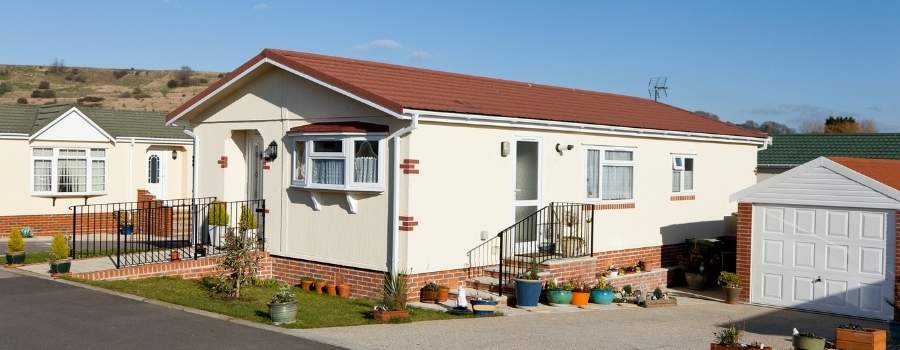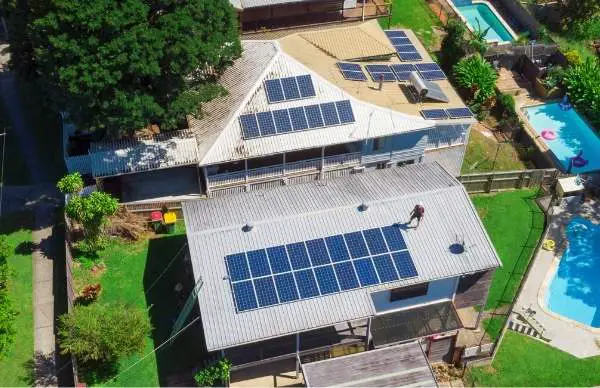
If you’re thinking about putting solar panels on your mobile home, you may have some concerns. I put this article together to address some common questions about solar panels for mobile homes so that you can decide whether it’s a good fit for you. The first question is likely, can you put solar panels on a mobile home?
Solar panels cannot be mounted to the roof of a mobile home since they’re not as structurally sound.
However, there are some great alternative options for mobile home and other prefab home owners such as ground mounting or mounting to other structures such as carports, garages, or sheds. More on this later…
Key Takeaways
- Determine how many Solar Panels are Needed
- Alternatives to Roof Mounting
- Lightweight Options
Table of Contents
How Many Solar Panels to run a Mobile Home
On average, to power a mobile home it would take 18 solar panels. This is based on an average usage of 22.5 kWh per day for an modest 1000 square feet of living space. This assumes that each panel has an output of 320 watts with about 4 hours of peak sunlight per day.
To determine how many solar panels are needed to power a mobile home, let’s consider the average size of a mobile home, the average electricity usage of a household, and the average power output of a solar panel.
- Average Size of a Mobile Home: Mobile homes vary in size, but a common size is about 1,000 square feet (1).
- Average Electricity Usage: The average electricity usage of a U.S. household is about 877 kWh per month, or about 29 kWh per day. However, the energy consumption in a mobile home might be slightly less due to its smaller size, so let’s estimate around 20-25 kWh per day (2).
- Average Solar Panel Output: Residential solar panel produces about 250 to 400 watts of power. Let’s use a median value of 320 watts for our calculations. The amount of energy a panel can produce in a day depends on the number of sunlight hours. On average, let’s assume 4 hours of peak sunlight per day, so a 320-watt panel would produce about 1.28 kWh per day (3).
Now, let’s calculate:
- Total Daily Energy Needs: 20-25 kWh (for the mobile home)
- Daily Energy Production per Panel: 1.28 kWh (320 watts * 4 hours)
To find out how many panels are needed, we divide the total energy needs by the daily energy production per panel:
Number of Panels = Daily Energy Production per Panel ÷ Total Daily Energy Needs
Special Considerations
There are several special considerations to keep in mind when installing solar panels on a mobile home. Mobile homes have a unique structure and roofing system that require careful planning and installation.
- Roof Type – The type of roofing on your mobile home can impact the installation of solar panels. If your mobile home has a flat roof, it may be easier to install solar panels. However, if your mobile home has a sloped roof, the installation process can be more complicated, and additional support may be required.
- Roof Condition – The condition of your roof is another important consideration. Before installing solar panels, you should inspect your roof to ensure that it is in good condition and can support the weight of the panels. If your roof is damaged or in poor condition, it may need to be repaired or replaced before solar panel installation.
- Size of the Solar Panel System – The size of your solar panel system should be based on your energy usage and the amount of sunlight your mobile home receives. A larger solar panel system will generate more electricity, but it may be more expensive to install. On the other hand, a smaller system may be more affordable, but it may not provide enough power to meet your needs.
- Permits and Regulations – Before installing solar panels on your mobile home, you should check with your local building department to determine if you need any permits or approvals. Some areas may have specific regulations regarding solar panel installation on mobile homes.
- Installation Method – The method of installation will vary depending on the type of roof and solar panel system you choose. For example, if you have a flat roof, you may be able to use ballasted racking, which involves securing the panels with weighted blocks. If you have a sloped roof, you may need to use a different type of mounting system to ensure that the panels are secure.
Alternatives To Roof Mounting
Generally, mobile home owners have to rely on other solar power mounting options. One option is to mount solar panels to other, permanent structures such as a garage, carport, or patio roof. Another option is to go with ground mounted solar panels as long as you have the space.
Install On Other Structures
- Roof of a Garage or Carport
- Roof of Deck or Patio
- Community Setup
Ground Mounted Solar Panels
If you have a large enough yard and get enough prime sun exposure, then ground mounted solar panels can be a great option for you.
They cost more to install upfront, but they offer a few advantages such as being easier to clean and maintain, which can end up saving you some money in the long run.
The downside to ground mounting solar panels is that they require quite a bit of yard space.
Thanks about how much roof space solar panels take up on the average home, now translate that to your yard…it’s going to take several square yards to accommodate them
This can be a problem if you live in a neighborhood with smaller yards or if you need the land for other things…gardens, play area for kids, etc.
Roof of Patio, Garage, or Other Structure
Garage
If you have a garage built on your property then solar panels can be installed up there and provide substantial solar power to your home. It may not be as large of an array as a typical home, but it will still be enough to let you power several systems in your home.

Carport or Patio
Another option is the roof of a carport or patio. Most patios are built off the back yard where sunlight is most abundant, so it’s usually an ideal place to have solar panels.
Sheds
They may have smaller roofs, but you can have several panels on various buildings all linked together and build up a decent sized array.
The main downside to these options is that you already have to have or be willing to build these structures…adding to your total investment. Also, even the largest of garages likely won’t accommodate the same number of solar panels that the roof of a home would.
Community Setup
Lastly, you could always work together with your neighbors to share in a community-based solar system setup. That’s the perfect solution for people who live in a mobile home park with no plan on moving anytime soon.
As a community, everyone can invest in a full-sized ground-mounted solar system that’s enough to power everyone’s RV. Given the relatively low energy demands of mobile homes, there will be plenty of solar power to go around!
While this may be an ideal solution for some, for most it’s likely the least desirable of the three solutions. Still, it may be worth looking into if enough of your neighbors happen to be interested.
Solar Panels Designed For Mobile Home
While there aren’t solar panels specifically designed for mobile homes, there are solar panels designed for less structurally sound roofs such as mobile homes and RV’s.
They are generally 100 Watt panels that can be daisy chained together to create a fairly powerful array.
The benefits of these panels is that they are much lighter and can usually be installed by the homeowner…though I’d still recommend consulting a solar expert.
They are also fairly portable, depending on how you mount them. This means you can move them through the year to take advantage of the suns movement or take them down completely during months where they might not be of much use…like the winter, especially if you live in a snowy area.
The biggest downside to these panels is that they are not as efficient as traditional solar panels. They are ideal for RV’s or as supplemental power for off-grid cabins, but they aren’t going to power an entire house.
Lightweight Solar Panels Mobile Home
Looking at various brands of solar panels, I believe I have found the top three lightest ones that could be suited for mobile homes.
Remember, it’s not just the panels that you have to consider, but also the weight of the racking, hardware, and wiring. This all adds up and can be detrimental to the structure of your roof…ALWAYS consult with a solar professional.
- ECO-WORTHY 200 Watt 12 Volt Complete Solar Panel Starter Kit: This kit is designed for ease of use, especially for beginners. It includes two 100W solar panels, each weighing 13.14 pounds. The panels have an efficiency of up to 21% and come with a 1-year warranty. Ideal for mobile homes due to their lightweight and easy installation.
- Renogy 300 Watts Solar RV Kit: This kit is robust, designed for RVs and mobile homes. Each panel weighs 22 pounds, with an efficiency of up to 22%. The kit includes a 10-year warranty, emphasizing durability and long-term performance.
- HQST 100W 12V Flexible Monocrystalline Solar Panel: Extremely lightweight at 5.3 pounds, making it highly suitable for mobile homes with weight restrictions. It offers up to 23% efficiency and comes with a 25-year warranty, highlighting its durability despite its light weight.
| Brand | Weight | Efficiency |
| Eco-Worthy 200W | 13.14 pounds | 21% |
| Renogy 300W | 22 pounds | 22% |
| HQST 100W | 5.3 pounds | 23% |
Boosting Solar Power Efficiency
No matter the type of home you’re trying to power with solar, there are always a few tips and tricks you can pick up to maximize the energy output of your solar array. Here are three handy tips:
- Optimize the Placement of Your Solar Panels – Regardless of what type of solar system you’re using, you’ll maximize their efficiency by making sure they are pointed directly at the sun for as many hours of the day as possible.
- Clean Your Solar Panels – Like any other surface, get dirty after a while. That dirt and any other debris that might fall onto it will reduce the amount of sunlight that gets through. So, from time to time, give your solar panels a good wipe down.
- Use Less Energy – Electrical system consists of two sides: energy production and energy use. If you want an overall more efficient solar panel system, learn to use the energy it produces more efficiently. A simple example is to switch to LED light bulbs that use less energy and generate less heat.
Frequently Asked Questions
Are Mobile Home Roofs Strong Enough For Solar Panels
In most cases, mobile home roofs are not strong enough to support the weight of solar panels. Mobile home roofs are built with smaller joists that can’t handle the extra weight of a solar array.
How Many Solar Panels Does It Take To Power A Mobile Home
Powering a mobile home should be fairly similar to powering a traditional home. Most homes require between 25 and 30 solar panels to completely offset their energy usage.

